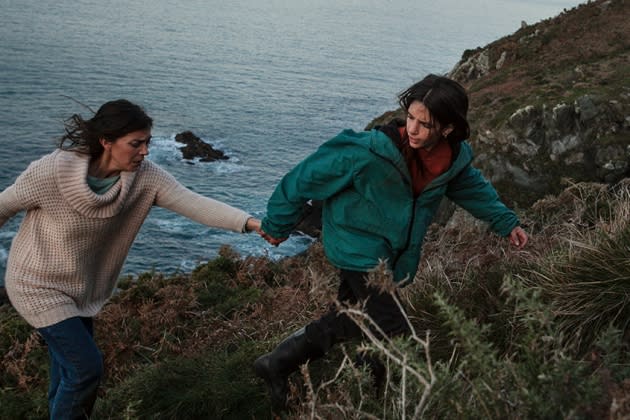Catalan Renaissance: Big New TV Series, International Co-Productions Ramp Up
- Oops!Something went wrong.Please try again later.

Over 2003-11, Catalonia’s regional film hub was the envy of Europe. Now, it’s enjoying the full flush of a second renaissance and growing its international impact in film and now TV. In 2022, three Catalan directors had titles in the main competition in Berlin and Cannes, more than Italy (two), Germany (one) or the U.K. (none). Helmer Carla Simon’s “Alcarràs” won Berlin’s top prize, the Golden Bear.
In 2023, five Catalan features have made Berlin’s fest cut, led by Estibaliz Urresola’s competition contender “20,000 Species of Bees,” Alvaro Gago’s “Matria” in Panorama and Carla Subirana’s “Sica,” a Generation 14plus player.
More from Variety
The most spectacular advance, however, comes in Catalonia’s Berlinale TV lineup. “The Chauffeur’s Son,” backed by “Elite” producer Zeta Studios and created by Isaki Lacuesta and Isa Campos, competes in Co-Pro Series. “This Is Not Sweden,” backed by Spain’s RTVE and Swedish pubcaster SVT, features in an ICEX-Iberseries showcase. From sisters Joan and Mireia Vilapiug, “Selftape,” a Filmin Original from Filmax, receives a Berlinale Series Market screening.
Their presence is no coincidence. The audiovisual arena now ranks as a “strategic sector” for the government, says Francisco Vargas, director of the audiovisual area at Catalan cultural industry agency ICEC. In 2019, total allocated ICEC audiovisual funding stood at €12.6 million ($13.7 million). It rose to $44.5 million last year.
In its latest move, in 2022 ICEC introduced grants, worth $1.64 million each, to five ambitious Catalan-language series budgeted above $4.4 million. “In terms of TV production, with our talent and bringing €1.5 million to the table, you don’t have problems negotiating with a streamer or broadcaster,” says Vargas.
“The series aims to have international reach. To do so, it needs partners,” Lacuesta says of “Son,” a grant winner. To attract them, that incentive is “just what we need.”
Without the grant, “This Is Not Sweden,” another recipient, “could not be made as was imagined,” says producer Marc Clotet.
In film, too, Catalonia looks set to walk a more international stage. Its hits already describe a broad gamut, from the avant garde, Albert Serra’s 2022 Cannes competition player “Pacification,” to crossovers such as Rodrigo Sorogoyen’s “The Beasts,” from Arcadia Motion Pictures, to Netflix best-ever Top 10 non-English movies, “The Platform,” co-produced by Barcelona’s Mr Miyagi, and “Through My Window,” produced by Nostromo.
From its inception in 1998, Barcelona’s Pompeu Fabra University’s creative documentary master’s degree has encouraged directors to mix documentary and fiction, such as in Lacuesta’s 2000’s debut, “Craven vs. Craven,” says “Sica” producer Alba Sotorra.
A “hybrid cinema character-izes many Catalan films,” she says. Carla Simon’s 2017 “Summer 1993,” a Berlin’s Best First Feature Award winner, brought down the flag on a New Catalan Cinema — frequently directed and produced by women — that added a large sense of place, whether a Basque village in summer (“20,000 Species”) or Galicia’s Rias Baixas fjords (“Matria”) and treacherous Costa do Morte cliff coast (“Sica”).
To date, these films have been made in pan-regional co-production. Their budgets do not require more. Of 44 Catalan film releases expected in 2023, however, 19 are directed by women who can broadly be identified as NCC figures. 12 are second features or beyond.
In 2017, ICEC bowed targeted aid for all links in the value chain. From 2020, ICEC operates a minority movie co-production fund, grants running up to €300,000 per production.
“Co-production is a question of trust. When you have talent, generate interest and are backed by a fund, you generate trust,” says Vargas.
The next natural step, as directors ambitions grow, is majority international co-production, says Mireia Graell, the Catalan producer of “Matria,“ which is made in co-production with Galicia. For their second film, she and Gago are eying co-production with Portugal, she adds, noting that more and more Catalan producers are tapping co-production funding from Eurimages.
“We’re a generation that has attended multiple development programs, abroad such as EAVE, or in Spain, such as Madrid Incubator. That creates bonds,” says Sotorra, a Eurimages recipient in 2022 for both “Read My Breasts” and “A Forgotten History.”
One way forward for Catalan cinema will now be to blend not only documentary and fiction but other elements such as fantasy, an effect seen in “Sica,” Sotorra adds.
Best of Variety
Sign up for Variety’s Newsletter. For the latest news, follow us on Facebook, Twitter, and Instagram.
